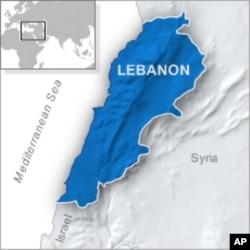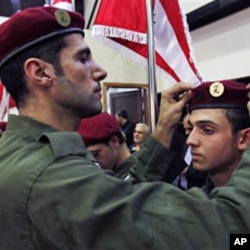The United States expressed its growing frustration with the Lebanese militant group Hezbollah and its patrons Iran and Syria on Thursday. U.S. Ambassador to the United Nations Susan Rice said actions by the three to escalate sectarian tensions so they can assert their own authority over Lebanon only serve to destabilize the tiny Mediterranean nation and the region.
There has been growing rhetoric between the United States and Syria in recent days about each other's actions in Lebanon and the greater Middle East.
Earlier this week, Syrian President Bashar al-Assad told the pan-Arab newspaper Al-Hayat that the United States has "created chaos" in every place it has entered. He cited Somalia and Afghanistan, as well as the U.S. intervention in Lebanon in the early 1980s.
In response, Washington accused Syria of destabilizing Lebanon by supplying arms to Hezbollah and issuing arrest warrants for senior Lebanese officials.
On Thursday, U.S. Ambassador to the United Nations Susan Rice told reporters that Washington continues to have "deep concerns about Hezbollah's destructive and destabilizing influence in the region." She also accused Syria and Iran of trying to undermine Lebanon's independence and endanger its stability.
"We understand that certain actors within and outside Lebanon - including Syria, Hezbollah, and Iran - may believe that escalating sectarian tensions will help them assert their own authority over Lebanon. However, these actors serve only to destabilize Lebanon and the region," said Rice.
She singled out Syria for further rebuke.
"Syria, especially, has displayed flagrant disregard for the sovereignty, territorial integrity, unity, and political independence of Lebanon under the sole and exclusive authority of the Lebanese government, as affirmed in resolution 1559," Rice said.
U.N. Resolution 1559 was adopted in 2004, and called for the withdrawal of all foreign forces from Lebanon - which at the time were primarily Syrian -- and reaffirmed its support for the country's sovereignty, territorial integrity and independence. It also called for the disbanding and disarming of all Lebanese and Palestinian militias in the country.
Syrian Ambassador Bashar Ja'afari dismissed the U.S. ambassador's comments, saying they were based on "wrong facts and information" in the U.N. Secretary-General's recent report on the implementation of Resolution 1559.
The U.N. diplomat in charge of implementing Resolution 1559, Terje Roed-Larsen, briefed the Security Council on its progress. Roed-Larsen, a veteran of Middle East crises, said after the closed door meeting that the region is at a critical juncture.
"I believe we are now seeing a region where we have crosswinds and a hurricane blowing up," said Roed-Larsen. "And in the middle of the cross winds there is a tent standing, and that tent is critically upheld by two poles - one is the Palestinian one and the other one is the Lebanese. If one of those poles crack, the whole tent will go down. In other words, if the Lebanese situation is destabilized, I am afraid that it will have rippling effects across the region."
In the U.N. Secretary-General's report, he warns that "Lebanese and non-Lebanese militias continue to operate in the country" beyond the government's control. He said the armed wing of Hezbollah remains "the most significant and most heavily armed" of the groups and that its military capabilities may exceed those of the Lebanese Armed Forces. He said Hezbollah's arsenal creates an "atmosphere of intimidation" and called on the group to disarm and become solely a political party.
The situation has grown more tense in recent months, as Lebanon awaits possible indictments soon by the U.N. tribunal investigating the assassination of former Prime Minister Rafik Hariri and 22 others in a massive truck bombing in 2005.
Syria has denied widely-held suspicions it was involved in the blast. Many observers expect the court to indict members of Hezbollah, which has the potential to throw the country back into violence.
On Wednesday, in a Beirut suburb that is a stronghold of Hezbollah, three members of the U.N. court were attacked and threatened by a mob of women at a doctor's office where they had gone to examine evidence.





